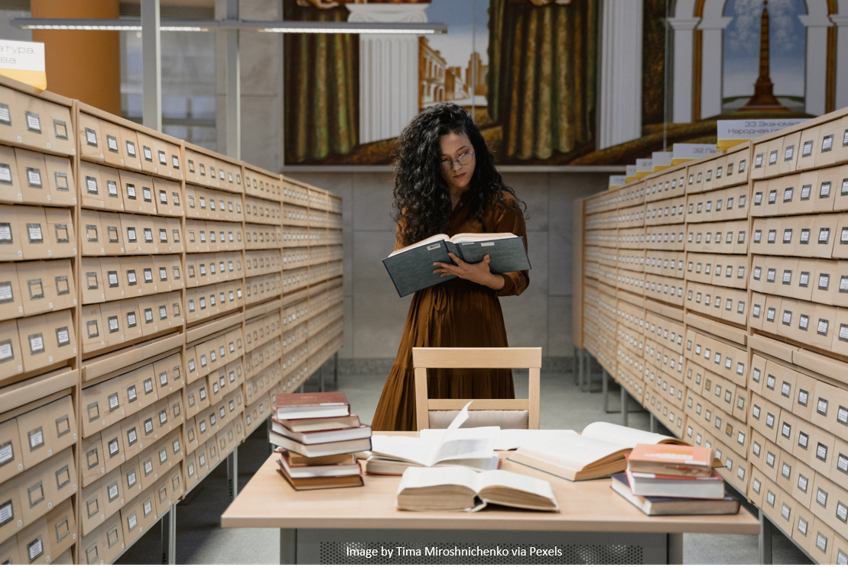If you’re anything like me, you might not have explored archives in your life. They’re just of dusty old documents anyway aren’t they?
Well some may think so, but I certainly don’t!
I went on a tour around the Hull History Centre and got to explore its archive material. Here is my experience of the the archives and how you can use them.
What is the Hull History Centre?
The Hull History Centre is situated in the heart of the city. It’s a building that definitely stands out with its unique architecture and swirly logo. But what actually is it?

The Hull History Centre is a collaboration between the University of Hull and the Hull City Council (Hull History Centre, 2017). It houses the archive material from both of them (Hull History Centre, 2017). Their aim, as stated on their website, is to “make history available to all, for research, for learning and for leisure” (Hull History Centre, 2016).
So, what counts as archive material? Archive material includes: dairies, photographs, maps, books, wills and everything in between (Hull University Archives, 2022a). What they all have in common is their “historical significance” (Hull University Archives, 2022b) as they give us a glimpse into the past and how people lived.
Are Archives Useful?
I’ve laid out in simple terms what archives are, but maybe you are wondering why archives are useful.
To put it simply, archives are there to be used! Whether you want to find out a little bit more about your family history, explore the exhibitions or research collections for your studies, there is something for everyone.
For Research and Learning
As I have mentioned, I never used archive material or the Hull History Centre when I went to university. But, I wish I did. After searching through the archives last week, I know there is definitely material that could have enhanced my studies as an English and Philosophy Student. Specifically, the material on Hull’s animal rights activism given that my thesis focused on animal ethics.

The SkillsGuides lay out some reasons why you may want to use archive material in your own studies. This includes to develop or critique an argument and to add historical, realistic context to your writing (Hull University Archives, 2022c). There are also more creative uses listed here which include using raw materials for films, artwork or for character development (Hull University Archives, 2022c). It is clear that archive material can come in handy for lots of different subjects. It is not just limited to history students.
For Leisure
The Hull History Centre isn’t just open to researchers, students and historians. Anyone can go and enjoy the facilities on offer. There is a small library collection of books concerning Hull on a variety of different subjects. Families can visit and see the exhibitions that are currently on display, or find the online exhibits here. There are also refreshments available in the small café.
If you’re interested in researching your family history, you can use their computers and different family history tracing websites. You can then request archive material based on any distant relatives that you find.
I have already planned to take my grandma on a day out!
The Archives Made Easy
In an effort to make sure that you use the archives, here I will highlight the things that I found useful when searching the archives for the first time.
For a more in depth look at using the archives, the Hull University Archives team have created a fantastic, in depth SkillsGuide on the archives that you can find here. But, this is what helped me the most.
1. Firstly, you can find guides on the different themes that are prevalent in the archives

This is a great place to start if you’re unsure of what is available in the archives.
Within each of these themes, there is a list of key subjects and collections. These lists give you a place to start when it comes to searching the archives. This will further narrow down your research and help you find what material could be useful to you.
For example, within the theme of ‘Women’, there is a collection of materials on Winifred Holtby. I could then use this reference (L WH) to search the Hull History Centre catalogue for all material related to Holtby. This can cut down your search time massively.

2. There is a specific SkillsGuide to help you find diverse voices within the archives
Given the way that history has been recorded, it can be even more difficult to find diverse voices within archive materials. This includes the voice and perspective of women, members of the LGBTQIA+ community and people of different ethnicities. These are the voices that have often been erased or deliberately omitted from the records.
In order to highlight these voices there is a SkillsGuide on them. Once again, this provides a good starting point for how to search for these voices at the Hull History Centre. There are also external links to other online archives that included them.

3. How to request archive material
I think one of the most nerve-wracking part of the archives is requesting the archive material. But like all things, it seems like a daunting task until you actually do it.
Let’s say you have found something in the archive collection that you think is useful to your studies or an interesting piece of family history. How do you go about requesting it? And why can’t you just pick it up off a shelf?
I recommend requesting archive material from the Hull History Centre in advance. The best way to do this is to directly contact the team there. Don’t worry, they’re all friendly! With the team, you can directly arrange to visit when it’s best for you within their opening times.
In order to preserve the material that is housed at the Hull History Centre, it has to be stored in a controlled environment. This includes the temperature and humidity. Trust me, having a jumper is a must when it comes to visiting the Hull History Centre. Especially if you’re like me and start to feel the cold very quickly. But, for these reasons, you can’t just wander in and pick up a pamphlet from the 1600s.

I think this is part of the reason why students and people in general may not use the archives. These items seem untouchable when they’re all locked away. But, I found last week that this isn’t the case. In fact, the materials are there to be used! They just have to be looked after so that future generations can also use them.
4. What to expect on the day
So, you have requested your archive material by having a lovely chat over the phone with one of the team. But, what will it be like on the day?
I can guarantee you one thing and that is, you will get cold, so take a jumper first and foremost! This is because the Searchroom, the place where you view the archive material, is also temperature controlled.

In the Searchroom, you can have your laptop, paper and a pencil (no pens!) (Hull History Centre, 2017b). The rest of your personal items can be stored in the lockers (Hull History Centre, 2017b). If you get a little hungry, then you can leave the room and buy some snacks or a coffee in the café. You’re going to have to fuel your brain for a day of research.
And like all things, it is not as scary as you think.
What I Found
Finally, I am going to end this post on my experience of the Hull History Centre.
Exploring the archives for the day and getting to see behind the curtain can only be described by me in one way. It’s like when you clean your messy room or start packing to move house. Bare with me on this analogy, you will see where I am going. As you’re cleaning or packing, you’re rediscovering different trinkets, old gadgets, books and pictures. Maybe you find a Now That’s What I Call Music CD and have to listen to the pop hits from 2007. All of these items are things you have forgotten about. But now, all the memories of your past are coming back to you. As soon as you put down one item, you find another and the cycle continues. Then, when you look at the time, you see that you’ve spent hours looking at a pile of belongings.
Well, that was my experience of the archives.
Now, that’s not to say that all of the material held in the archives will bring the same level of joy as finding your old Tamagotchi. It is history after all. As I have previously highlighted, many voices have been deliberately omitted and some material is shocking and even offensive. But, it is preserved as one account of the past. My analogy of the archives only serves to highlight how it felt to explore the Hull History Centre as a whole and the curiosity that comes with searching the archive material. I was intrigued by the volume and variety of the items housed there. Though I realise that not everyone will feel the same way that I do.
Jess’ Highlights
Some of my favourite pieces in the material include one of George Gray’s microscopes and Larkin’s personal book collection (there is a lot of Shakespeare). I also enjoy listening to true-crime podcasts, so the different crime and trial records were fascinating.

That concludes my day of searching the archives at the Hull History Centre. I hope this has highlighted how accessible and useful archive material can be, whether you’re a student, a historian or just want to know a little bit more about the past.
You can check out more of my blogs here.
For Reference
Hull History Centre (2017a) Our policies. Available online: https://www.hullhistorycentre.org.uk/about-us/about/policies.aspx [Accessed 07/09/2022].
Hull History Centre (2017b) Searchroom. Available online: https://www.hullhistorycentre.org.uk/about-us/about/policies.aspx [Accessed 07/09/2022].
Hull History Centre (2016) Our vision and mission. Available online: https://www.hullhistorycentre.org.uk/visit-us/our-facilities/searchroom.aspx [Accessed 07/09/2022].
Hull University Archives (2022a) Understanding Common Record Types, SkillsGuides, University of Hull. Available online: https://libguides.hull.ac.uk/common-record-types [Accessed 07/09/2022].
Hull University Archives (2022b) What are Archives, SkillsGuides, University of Hull. Available online: https://libguides.hull.ac.uk/archives-basics/what-are-archives [Accessed 07/09/2022].
Hull University Archives (2022c) Archives- The Basics: Using Archives, SkillsGuides, University of Hull. Available online: https://libguides.hull.ac.uk/archives-basics/using-archives [Accessed 07/09/2022].

2 replies on “Searching the Archives: a day at the Hull History Centre”
This is helpful and enlightening. It shines a light on the City of Hull and its fantastic university. The Brynmoor Jones Library and Hull History Centre are a a vital source of information and have so much to offer the public, the curious, history buffs and students. Many thanks.
You are very welcome, we are happy to hear that you found this post interesting and informative. We are fortunate, in Hull, to have such a wealth of fascinating resources at our fingertips.